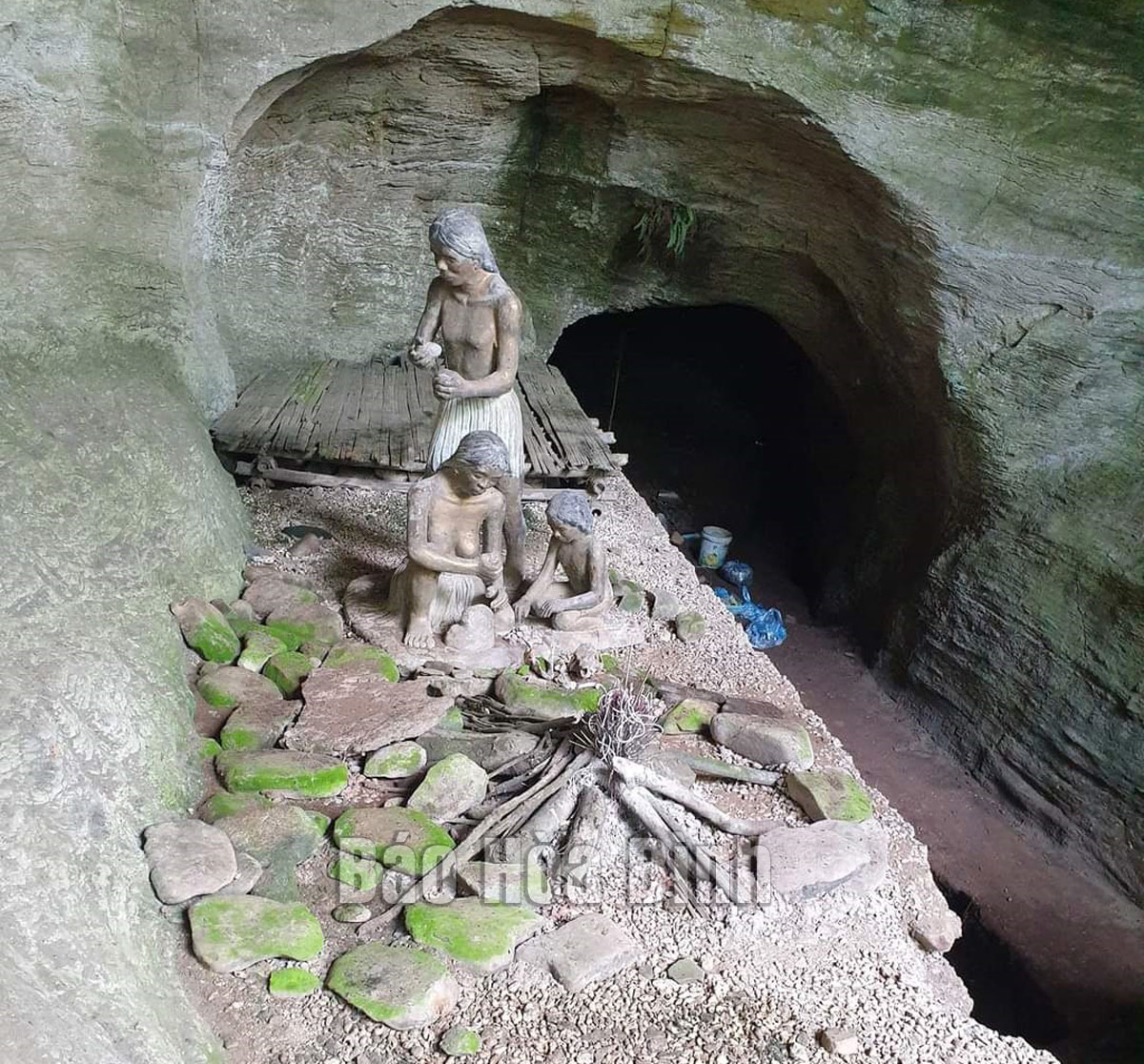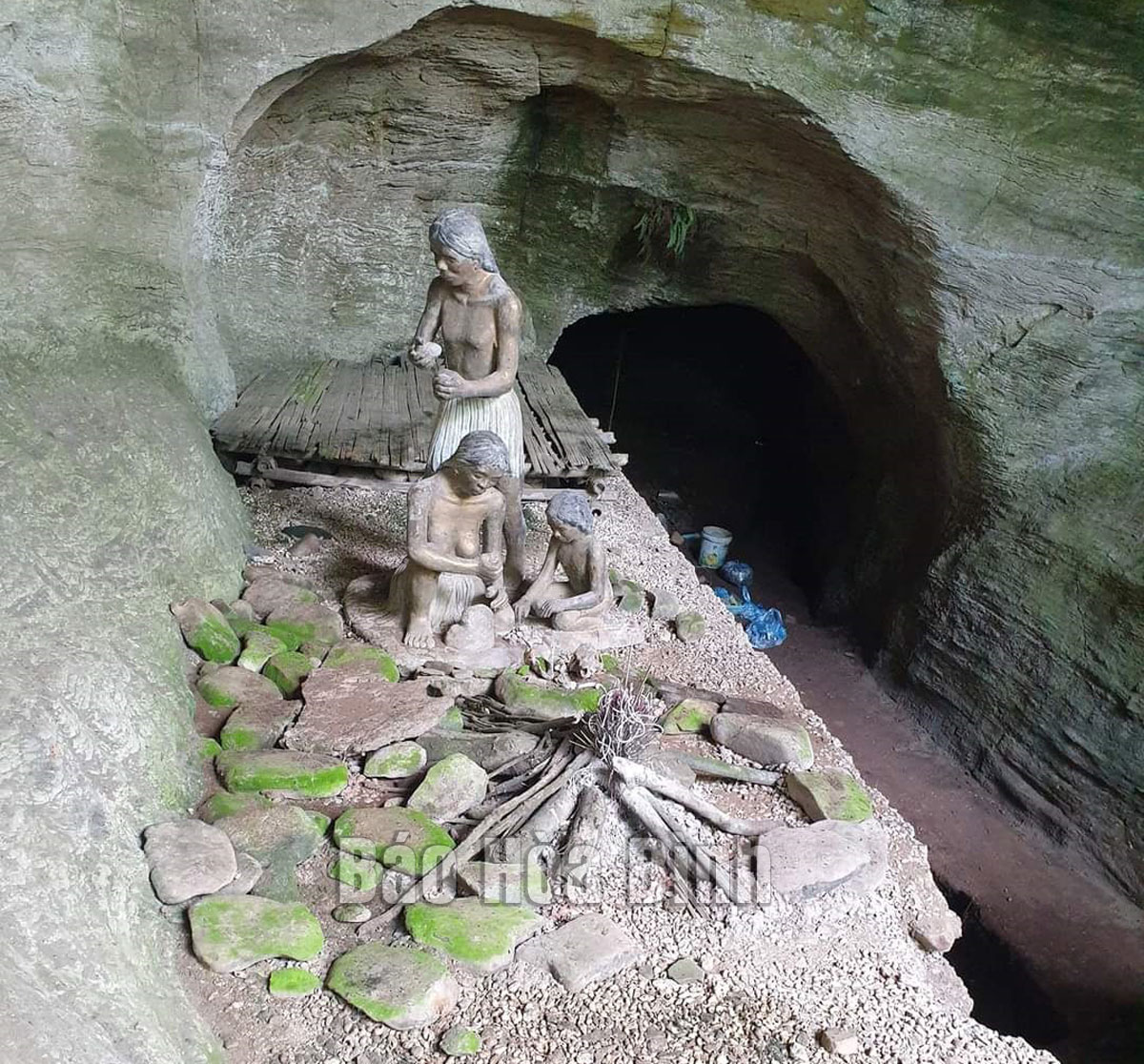
(HBO) – The Hoa Binh Civilisation, dating back to the Stone Age, was discovered by French archaeologist Madeleine Colani and named after the cave relics found in the karst areas of Hoa Binh province. In Vietnam, its traces have been unearthed mostly in Hoa Binh and Thanh Hoa provinces (over 80% of the total relics), while the rest scatter in the provinces of Thai Nguyen, Lai Chau, Son La, Ninh Binh, Ha Nam, Nghe An, Ha Tinh, Quang Ninh, Quang Binh, Quang Tri, and some others. Not only in Vietnam, this civilisation also existed across the mainland Southeast Asia, from southern China to Sumatra Island of Indonesia, Myanmar, and the Philippines.
A demonstration of the life of primitive humans at Xom
Trai Cave in Tan Lap commune, Lac Son district.
The reason for the concentration of Hoa Binh
Civilisation relics in Hoa Binh and Thanh Hoa is that local karst areas had
stable and consistent geological features, and they were also located in the
transition zone of the northern, western and southern geological regions. That
blessed the two provinces with diverse and complex natural conditions as well
as creature richness, resulting in food abundance.
Caves and rock shelters of the Hoa Binh
Civilisation were located at about 15 - 20 metres above the valley’s bed. The
residential space of people at that time varied according to relic sites. Some
caves and shelters are 10 square metres wide while others cover thousands of
square metres, but most have an area of 50 - 150 square metres. Those places
were also lit and warmed by sunlight in the morning. More than 90% of those
sites could keep their inhabitants from cold northwest winds in winter.
Late Professor Tran Quoc Vuong highly valued the
residential locations of the Hoa Binh Civilisation people, saying those places
were the prerequisite for primitive humans to develop agriculture and move to
lowland areas to develop a new civilisation.
Archaeological documents and excavations showed
that hunting and foraging were the main ways of subsistence of people of this
civilisation. Those activities mainly took place in valleys.
Working tools in the Hoa Binh Civilisation were
made from wood, bamboo and pebble. When finding places to reside in, apart from
choosing the sites with necessary natural conditions like sunlight, rivers, and
streams, people at that time also paid special attention to those near pebble
and limestone sources to make working tools.
Archaeological findings also revealed that women
played the main role in creating working tools while men were in charge of
hunting. Women also hunted small animals and mollusk, and picked vegetables and
fruit, which were not as hard as men’s work but generated high economic value.
Women were also responsible for bringing up children, sustaining fire, cooking,
and storing food. Therefore, women’s role gradually became important and
indispensable in each cave of primitive humans.
Ninety years have passed since the discovery of
the Hoa Binh Civilisation, but there remain a number of questions waiting for
answers about this civilisation before a panorama of the society in that period
could take shape./.
With an increasingly vibrant and widespread emulation movement aimed at building cultured residential areas and cultured families, Yen Thuy District has been making steady progress toward improving both the material and spiritual well-being of its people, while fostering a civilized, prosperous, beautiful, and progressive community.
Once lacking recreational spaces and community facilities, Residential Group 2 in Quynh Lam Ward (Hoa Binh City) has recently received attention for the construction of a new, spacious, and fully equipped cultural house. The project followed the model of state support combined with public contributions in both labor and funding.
The "All people unite to build cultural life" movement, which has been effectively integrated with Kim Boi district’s socio-economic development goals, is fostering a lively spirit of emulation across local residential areas, hamlets, villages, public agencies, and enterprises. In addition, through the initiative, traditional cultural values are being preserved and promoted, while community solidarity and mutual support in poverty reduction and economic development are being strengthened.
A working delegation of the Hoa Binh provincial People’s Committee led by its Permanent Vice Chairman Nguyen Van Toan on June 11 inspected the progress of a project to build the Mo Muong Cultural Heritage Conservation Space linked to tourism services in Hop Phong commune, Cao Phong district.
Born and growing in the heroic land of Muong Dong, Dinh Thi Kieu Dung, a resident in Bo town of Kim Boi district, in her childhood was nurtured by the sweet lullabies of her grandmother and mother. These melodies deeply imprinted on her soul, becoming an inseparable part of her love for her ethnic group's culture. For over 20 years, this love for her hometown has driven Dung to research, collect, and pass down the cultural values of the Muong people to future generations.
In the final days of May, the Ethnic Art Troupe of Hoa Binh Province organized performances to serve the people in remote, mountainous, and particularly disadvantaged areas within the province. These were not just ordinary artistic shows, but they were the meaningful journeys aimed at spreading cultural values, enhancing the spiritual life of the people and contributing to the preservation of ethnic minority cultural identities.



